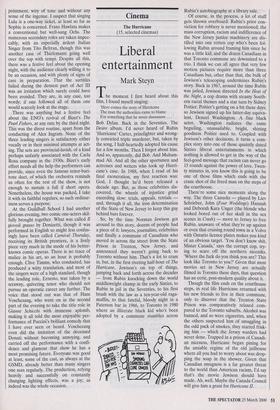Cinema
The Hurricane (15, selected cinemas)
Liberal entertainment
Mark Steyn
The moment I first heard about this film, I found myself singing: 'Here comes the story of Hurricane
The man the authorities came to blame
For something that he never duuuuuun . . . ' Bob Dylan. Back in the Seventies. The Desire album. I'd never heard of Rubin 'Hurricane' Carter, prizefighter and wrong- ly convicted triple murderer, but, taken by the song, I half-heartedly adopted his cause for a few months. Then I forgot about him. And so, apparently, did Bob. And Muham- mad Ali. And all the other sportsmen and actresses and writers who took up Hurri- cane's case. In 1988, when I read of his final exoneration, my first reaction was: God, I thought he'd been released a decade ago. But, as those celebrities dis- covered, the wheels of injustice grind exceeding slow: trials, appeals, retrials — and, through it all, the iron determination of the State of New Jersey to keep this guy behind bars forever.
So, by the time Norman Jewison got around to this story, dozens of people had a piece of it: lawyers, journalists, celebrities and finally a commune of Canadians who moved in across the street from the State Prison in Trenton, New Jersey, and announced they weren't going back to Toronto without him. That's a lot to cram in, but, in the first riveting half-hour of The Hurricane, Jewison's on top of things, jumping back and forth across the decades — from Rubin knocking down the world middleweight champ in the early Sixties, to Rubin in jail in the Seventies, to his first brush with the law as a ten-year-old raga- muffin, to that fateful, bloody night in a Paterson bar in 1966, to Toronto in 1980 where an illiterate black kid who's been adopted by a commune stumbles across Rubin's autobiography at a library sale.
Of course, in the process, a lot of stuff gets thrown overboard: Rubin's prior con- viction for robbery is never mentioned; the mass corruption, racism and indifference of the New Jersey justice machinery are dis- tilled into one rotten cop who's been fol- lowing Rubin around framing him since he was a little kid; and the dozen Canadians in that Toronto commune are downsized to a trio. I think we can all agree that very few motion pictures require more than three Canadians but, other than that, the bulk of Jewison's telescoping undermines Rubin's story. Back in 1967, around the time Rubin was jailed, Jewison directed In the Heat of the Night, a cop drama with steamy South- ern racial themes and a star turn by Sidney Poitier. Poitier's getting on a bit these days, so Jewison signed up his latter-day equiva- lent, Denzel Washington. A fine black actor, Washington radiates the same beguiling, unassailable, bright, shining goodness Poitier used to. Coupled with Jewison's other decisions, it turns a com- plex story into one of those quaintly dated Sixties liberal entertainments in which nothing is allowed to get in the way of the feel-good message that racism can never go 15 rounds against the power of love. Twen- ty minutes in, you know this is going to be one of those films which ends with the crane shot of the freed man on the steps of the courthouse.
There're some nice moments along the way. The three Canucks — played by Liev Schrieber, John (Four Weddings) Hannah and Deborah Kara Unger (the blonde who looked bored out of her skull in the sex scenes in Crash) — move to Jersey to free Rubin, unaware of what they're up against or even that cruising round town in a Volvo with Ontario licence plates makes you kind of an obvious target. 'You don't know shit, Mister Canada,' says the corrupt cop, try- ing to scare off the northern niceniks. 'Where the fuck do you think you are? This look like Toronto to you?' Given that most movies set in New Jersey are actually filmed in Toronto these days, that question has an eerie, post-modern quality about it.
Though the film ends on the courthouse steps, in real life Hurricane returned with his new friends to live in their commune, only to discover that the Trenton State Prison was comparatively relaxed com- pared to the Toronto suburbs. Alcohol was banned, and so were cigarettes, and, when the others suspected him of smuggling in the odd pack of smokes, they started frisk- ing him — which the Jersey warders had never done. Trapped in a prison of Canadi- an niceness, Hurricane began pining for the amiable regime of the old jailhouse where all you had to worry about was drop- ping the soap in the shower. Given that Canadian smugness is a far greater threat to the world than American racism, I'd say that's the movie Jewison should have made. Ah, well. Maybe the Canada Council will give him a grant for Hurricane II.


































































 Previous page
Previous page